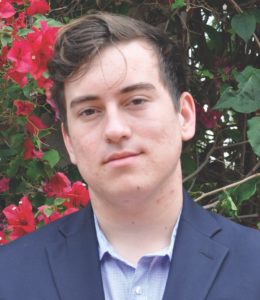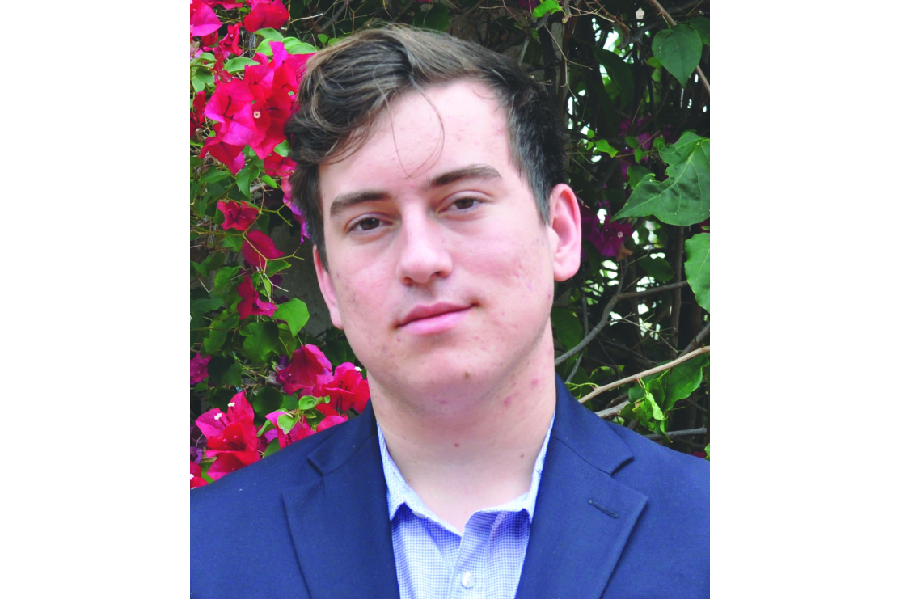By Timothy Fanning
A former Student Government leader says he was kicked out of school in May after he was found guilty of sexually assaulting a female student in his dormitory room.
Now he is suing the university, contending that the charges were false and he was denied due process in contesting them.

In his suit, filed June 28 in Pinellas Circuit Court, the student asks the court to overturn his expulsion and remove a cloud over his future.
“Although I am not looking to ever re-enroll at USF, an expulsion will effectively end my journey anywhere else,” he says in documents included in the lawsuit. “I will lose all opportunities to obtain a good education as well as to pursue my dream of going to law school.”
The lawsuit does not name him, calling him John Doe, but it says he resigned from Student Government last spring after he was elected vice president of the student body.
That would be Samuel Goetz, then 19, whose resignation on April 17 – just seven weeks after he was elected – caught Student Government by surprise and forced president-elect David Thompson to name a new vice president.
Goetz, who is now attending college elsewhere, declined to comment on the lawsuit.
Dean of Students Jacob Diaz, who upheld a university conduct board’s decision to expel Goetz, declined to discuss the case with The Crow’s Nest, citing the pending lawsuit.
But documents in the lawsuit spell out the reasons the university board decided to expel Goetz.
The board concluded that Goetz was guilty of non-consensual sexual contact and non-consensual intercourse.
“(Goetz) does not deny that the sexual contact and sexual intercourse occurred,” the board found.
“He also admits to ‘fake crying’ to try to make the other student feel better about what happened and to ‘console her.’”
The board also found that the woman – called Jane Roe to protect her identity – tried to decline intercourse with Goetz by repeatedly telling him no.
A national debate
The expulsion and lawsuit come at a time of renewed national debate over sexual assault on America’s college campuses.
During the administration of Barack Obama, the U.S. Department of Education warned that campus sexual assaults had become a major problem. It directed school officials to crack down on alleged sexual offenders or risk losing some federal funds.
The Obama administration also ordered that sexual assault complaints should be investigated using a “preponderance of evidence” standard. That is a lower burden of proof than the “clear and convincing evidence” standard previously used by many schools and the “beyond a reasonable doubt” standard used in criminal courts.
In recent weeks, Betsy DeVos, the new secretary of education in the administration of Donald Trump, has signaled that she would reconsider the Obama era guidelines. Critics of the guidelines say they go too far, creating a bias against students accused of assault.
“I think that on one level it makes sense that the Office of Civil Rights (in the Department of Education) should be calling into question things like ‘how are we providing the process and what is the most fair for all parties involved,’” said Dean Diaz. “To me this is part and parcel of having any new presidential administration in place. I think those accused should question the (Obama-era) policy. It’s in their right to question how this is being applied in both an academic institution as well as legally.”
The Goetz case marks the second time in three years that a student accused of sexual assault has been expelled by the university.
In May 2014, Darren Lasso was arrested on sexual battery charges and kicked out of school after he assaulted a female student in her dorm room.
Lasso, who faced up to 15 years in prison if convicted, later pleaded guilty to a lesser charge of felony battery. He was sentenced to five years’ probation and ordered to perform 100 hours of community service and pay $1,334 in court costs.
Through his attorney, he expressed remorse for his behavior.

According to USFSP’s annual security and fire safety report, there were four reported cases of rape on campus from in 2013 – 2015. Data that would reflect cases reported last year isn’t available until Oct. 1.
The annual security report reflects any cases reported to campus security or a campus authority, and does not include incidents of rape reported anonymously.
Student, faculty and staff safety is a high priority for the university, Diaz told The Crow’s Nest.
“I make it a point to tell students and their families that we take safety and security very seriously,” said Diaz. “What that looks like on campus is we have 350 video cameras, a state sworn police department that is available 24 hours a day, seven days a week. We want every student, faculty and staff member to feel like they can invest in their education in a safe way. Our role is to be as responsive and diligent as possible in responding to any incidents that get in the way of that.”
Differing accounts
The victim in Goetz’s case reported the assault to the university but did not file criminal charges against him.
According to documents in Goetz’s lawsuit against the university, the incident happened during the evening of Sept. 28, 2016, and early morning of Sept. 29.
The woman encountered Goetz in the dorm room of two of her friends, then later accepted his invitation to come to his room to “cuddle.”
They began kissing, according to the documents, and – at his urging over the course of several hours – she consented to digital penetration. She also asked him to put on a condom.
In the hours after the incident, Goetz and the woman traded text messages and Goetz seemed to offer an apology.
“I didn’t want you (to) have sex, it hurt and I was scared,” she wrote.
“I know,” she said he replied. “I’m sorry. I pushed things I really didn’t have any intention of making you do anything you didn’t want to. I misread a lot of signals.”
At that point, their accounts differ.
They both say he had intercourse.
He says he did not “force or coerce her to engage in sexual intercourse … Every moment of my encounter with (the woman) was consensual. When she expressed that she was uncomfortable with anything that we were doing, I immediately stopped.”
But she denies that. She says she repeatedly told him no and he persisted. At one point during the assault, she says, he pressed her body against a wall.
On Oct. 5, six days after their encounter, the woman called the university’s anonymous hotline to report an assault, and on Nov. 16, she filed a formal complaint, saying the sexual interactions “went further than she anticipated or gave consent to.”
On Nov. 23, she and a campus victim advocate went to the dean’s office to “clarify the contents of her written complaint.”
When Goetz was advised of the charges, documents show, he was not suspended. But he was ordered to have no contact with the woman.
He appeared for an interview with university officials on Dec. 16, hired a lawyer and provided a written statement denying the allegations on Jan. 4. After a hearing on May 3, a university conduct board – a panel of students and faculty members – found him guilty of “non-consensual sexual contact.”
Diaz, the dean of students, accepted the board’s findings and expelled Goetz on May 10, then denied Goetz’s subsequent appeal on May 31.
Making his case
In pleading his case with university officials, and now in his lawsuit, Goetz contends that he was railroaded.
A few hours after the encounter in his dorm room, he says, the woman invited him to breakfast. After breakfast with two others, he says, they strolled over to the bookstore together.
Later that day, he says, the woman asked him for a date, which he declined. It was only after she learned from social media that he had gone out with another woman that she filed the complaint, he says.
Although he was ordered to have no contact with the woman, Goetz says, the university permitted him to remain on campus, attend classes, serve in the student Senate and run for vice president. He was elected March 2.

If the university “really felt that the petitioner (Goetz) was such a threat that expulsion was the necessary remedy, why did they wait nearly an entire school year to impose the sanctions?” his lawsuit says.
The lawsuit also contends that Goetz was denied due process by the university throughout its investigation and the university “failed to meet the burden of proof of providing competent substantial evidence.”
He was not allowed to see the text message evidence submitted by the woman or the statement of allegations she made against him, the suit says. He also was denied the opportunity to cross-examine her because she was permitted to submit written testimony rather than appearing for testimony at the conduct board hearing.
“At Samuel’s hearing, there were three students and one faculty member,” Goetz’s attorney, Mark O’Brien, told The Crow’s Nest. “The complaining witness did not testify nor could we force her to testify. There is no right to cross-examination. At the end of an hour hearing, three students ended Samuel’s academic life, so, yes, the process is unfair.”
Goetz, who withdrew from his classes before the hearing, has no intention of seeking re-enrollment at the university, his suit says.
He asks the court to overturn his expulsion and remove the blot on his record.
Goetz is “19 years old and standing at the proverbial fork in the road,” the suit says. “He is hoping that you (the court) will allow him the opportunity to pursue his education elsewhere without a formal expulsion on his record to follow him for the rest of his life and potentially prohibit him from ever pursuing law school and his dream of becoming an attorney.”



